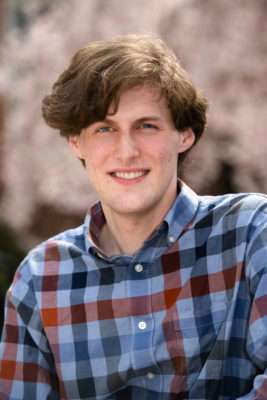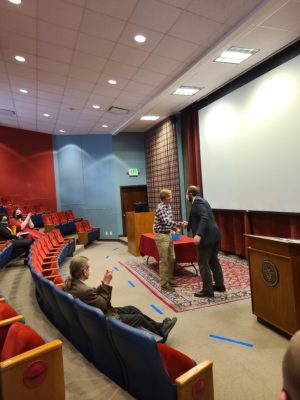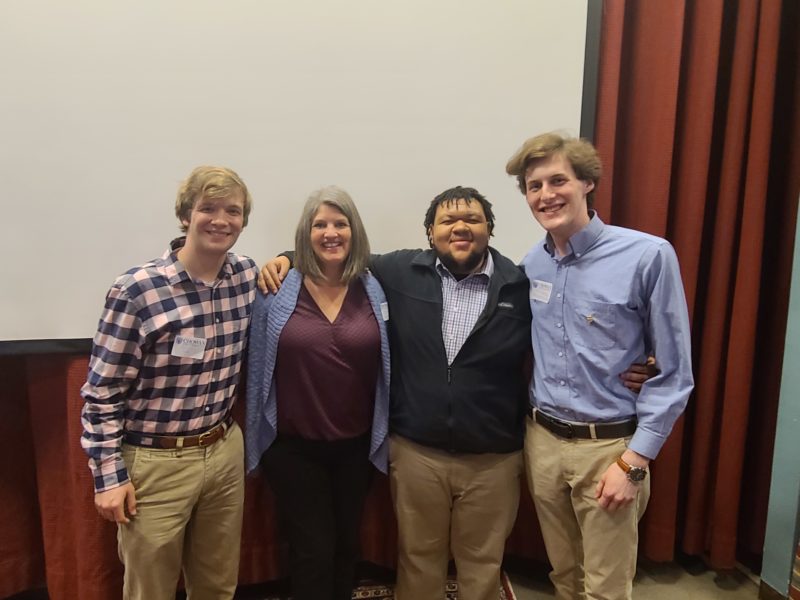University of Lynchburg students took home two of the six available Phi Alpha Theta Regional Paper Prize Awards at the history honor society’s 2022 Virginia Regional Conference. The conference was held Saturday, March 26, at Chowan University in Murfreesboro, North Carolina. More than 30 competitors from universities across Virginia participated.

Rick Smallshaw ’24, a history major and Westover Honors Fellow from Lynchburg, Virginia, took first place in the undergraduate World History category for his paper, “Religious, Linguistic, and Material Culture as Indicators of Prejudice and Social Stratification in the Dutch Cape Colony, 1652-1795.”
For his win, Smallshaw received a cash award and a newly published hardback book in his area of study. He is also eligible to present at the biennial national conference in Albuquerque, New Mexico, in January 2023.
“My paper explored the origins of class-based, race-based, and religious-based stratification in South Africa by examining the influences of its Dutch rulership from the mid-17th to early 19th century,” said Smallshaw, who also has minors in medieval and renaissance studies, art history, and German.
“I examined everything from wills to paintings, travel journals to architectural plans, and determined that despite the Cape’s diversity of culture as a Dutch colony, it was not a traditional ‘melting pot’ of these cultures. Such diversity, rather, did more to fuel sentiments of prejudice and racial, economic, and religious superiority among the Cape’s various communities.”
This week, Smallshaw presented his research at Lynchburg’s annual Student Scholar Showcase and at the inaugural Virginia Conference on Race at Roanoke College.
Smallshaw first started researching the topic in 2021, when he wrote an early version of the paper for his Atlantic World History class. “I wanted to explore an ‘unconventional’ area of the Atlantic world,” he said.
“I eventually landed on the Cape Colony, due to its precarious position between different spheres of global trade — Atlantic and Pacific/Indian oceans — which again shines through in its cultural diversity.”

Since then, Smallshaw has expanded and refined his research — work that could continue long after this year. “I’m still a junior and in the process of planning my Westover thesis topic, and because I’m a medievalist at heart, I plan to focus my thesis on something in that area of history,” he said.
“However, I hope to still continue to work on the Cape Colony project and learn more about South Africa as a whole. My research only scratched the surface of this country’s rich history.”
Chris Pierson ’22, a history major and international relations minor from Mechanicsville, Virginia, placed third in the undergraduate American History category for his paper, “The Military Industrial Complex: A Comparison of Vietnam and Afghanistan.”
He initially wrote the paper for his History Senior Thesis class. “[It’s] about how defense companies and defense contractors have, for the longest time, been too invested in war,” he said. “They are the ones that make millions and billions off of war, so it’s obvious to ask questions regarding their role.”
Pierson is contemplating a career in public service and maybe teaching, perhaps at the college level, later in life. He said researching and writing the paper “will help me, as most of the future jobs will require a comprehension of technology and a sharp mind that can critique. Writing this paper, and finding many counterarguments, definitely helped me in that regard.”
Jacob Jones ’25, a history major and Westover Honors Fellow from Appomattox, Virginia, participated in the Q&A portion of the conference.
“The success of winning awards at the conference showcases not only the good work our students are doing in the classroom but also their dedication to their studies and their discipline beyond earning an academic grade,” said Dr. Lisa Crutchfield, assistant professor of history and faculty advisor for Phi Alpha Theta.
“I am so proud of them. Chris and Rick did an amazing job. We all encourage students to do their best work and it’s especially rewarding when they receive outside recognition through external blind judging.
“In addition, it was a strong field and we went up against much larger schools with larger contingents. I am so impressed that, with only two presenters, we captured two of the six available undergraduate awards.”

Lynchburg has submitted winning entries at the regional conference for at least three years in a row. “These gentlemen did outstanding work and upheld our — at least — three-year running streak of award-winning entries,” Crutchfield said.
“Their hard work was evident — months of research, weeks of writing and revisions, and multiple practice runs culminated in impressive papers, polished presentations, and engaging discussion.”
In an email, Crutchfield also thanked the history faculty for working with the students on their projects and “all faculty for supporting their endeavors every day.” She added that the group’s participation in the conference was supported by the Turner Fund, which honors the contributions of John M. Turner Jr., a longtime faculty member and 1929 Lynchburg graduate.

